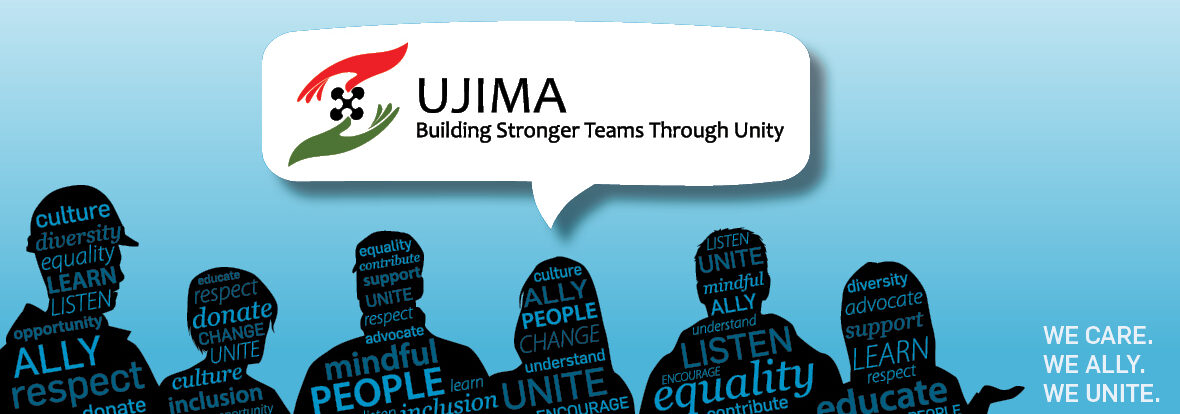We care. The story below reflects some of the biases we have encountered at varying levels. This story combines viewpoints to help you understand what racism looks like, how we prepare for it and how we have excused it. We feel this is an important baseline before we talk about self-reflection and becoming an ally.
“I get up in the morning to head to the jobsite. It will be one of my final weeks making this commute. The job has been going on for 3 years and it will the first one that I get to see from groundbreaking to close out. It has not been an easy project, but the long nights and weekend shifts have paid off since I was able to help the team stay on schedule. The nearly finished building is beautiful. The staff have just arrived and are raving about the space. I get in at 7:05 AM and check my email. We are supposed to get our badges from the building personnel today. The rest of the team comes back into the trailer with their badges and they tell me to go get mine. They explain that I should go see the person at the front desk and I should be fine as long I say I am with the company, and the whole process, picture and all, should take only a couple of minutes.
I decide to put on all my PPE (vest, hardhat, gloves, etc.) and head inside the building. In my case, you can never look too official. I get to the desk and introduce myself and let them know that I am with the Gilbane team. The person looks at me with a blank stare and eyes pan up and down at me as if something is not right. I think to myself, “I know this look. This is a look you get when someone doesn’t believe you are who you claim to be. Surely after they examine the matching logo on my hardhat, vest and my polo it should clear up any confusion.” The silent blank stare continues for what feels like 5 minutes. I smile an awkward smile to help ease along the interaction. Curious if the person does not understand my introduction, I show my business card and explain that I am going to the badging office. The person replies, “I can’t let you through without a badge, I will need to have you fill out guest paperwork and have you escorted with security to your location.”
I am immediately confused about why the team left out this part of the process. I mention that my colleagues came in a few minutes earlier for the same thing and they didn’t have to go through all of this. I am told, “I don’t know what to tell you. This is protocol.” I quickly realize that it is happening again. I take a deep breath as I have always done in this situation, remembering that I am different from my colleagues. I reason with the situation and explain to myself that this person is “only doing their job.” I am the only one that looks like me. I am the only black person on this project.”
We ally. There is a need to repair the system at its roots through dialogue and action. This is what UJIMA is pursuing inside and outside of Gilbane. UJIMA’s executive sponsor and fifth generation family member, Paul Choquette III, is a vocal ally and leader. “Anyone should feel welcomed, safe and respected in any environment (school, work, grocery shopping, casually jogging, driving their own vehicle, and so on). In order to prepare to be an ally and truly become an anti-racist, it is important to take a deeper look inside yourself as an act of self-reflection. And I am working to educate myself and others. These are important steps in the process,” says Paul.
We provide a few questions you can start with below.
- Did I ever witness an unfair judgment in the workplace of any people of color? If so, how did my actions impact the situation?
- Have I ever felt that my skin color could affect my success? And can I openly talk about it?
- Have I ever felt like I should do more to abolish racism and racial inequality? If so, where should I start?
We unite. Once you have gone through some self-reflection, educate yourself and others. Here are some ways you can work on becoming an ally:
- Participate in conversations about race. They may seem uncomfortable at first, but if you keep educating yourself on the facts, then those conversations will make more sense.
- Don’t expect to talk about these issues with a black person specifically. You can seek out readings and get informed, and at the same time, share them.
- Call out and reject micro-aggressions against black people.
- Amplify what you like about black culture. Share black stories, black art, uplift black voices and so on.
- Use your influence and resources to empower the black community in your area.
UJIMA is a community of Black/African American employees and advocates at Gilbane who foster an inclusive culture by attracting and supporting professional development, community engagement and providing a voice across the enterprise.
Our next Gilbane Ink blog in the Employee Resource Group (ERG) Ally Series will be published on Thursday, June 18th and will feature insights from Pride – a group dedicated to build upon a strong foundation of Gilbane’s family culture to ensure that all members of our community can be their authentic self. The ERG creates visibility for volunteerism and education around LGBTQIA causes and matters.


3 Replies to “UJIMA: Advice For Becoming An Ally”
Jessica Sosa
Thank you for putting together this thoughtful article!
Jeff Haluch
Its unfortunate, and frustrating in today’s society we have not moved past this issue. I grew up in a diverse surrounding and I have never treated anyone differently based on Race or Ethnicity,and my kids have been raised the same way. But its clear after seeing the events of the last month and reading stories of this nature that things remain very much as they have. Very disappointing that human beings continue to disappoint human beings!
AFOLABI ADESANYA, Senior Construction Quality Control Manager
I still believe that all human will rethink, respect, and accept each other no matter the race, color, religion, sex, or ethnicity. Right now ideologies separate us, dreams and anguish will bring us together. The first step is already in progress [ERG]; Never doubt that a small group of thoughtful minds as Ujima can never change the perspectives of racial inequality but we need to forgive because no future without forgiveness.
Comments are closed.